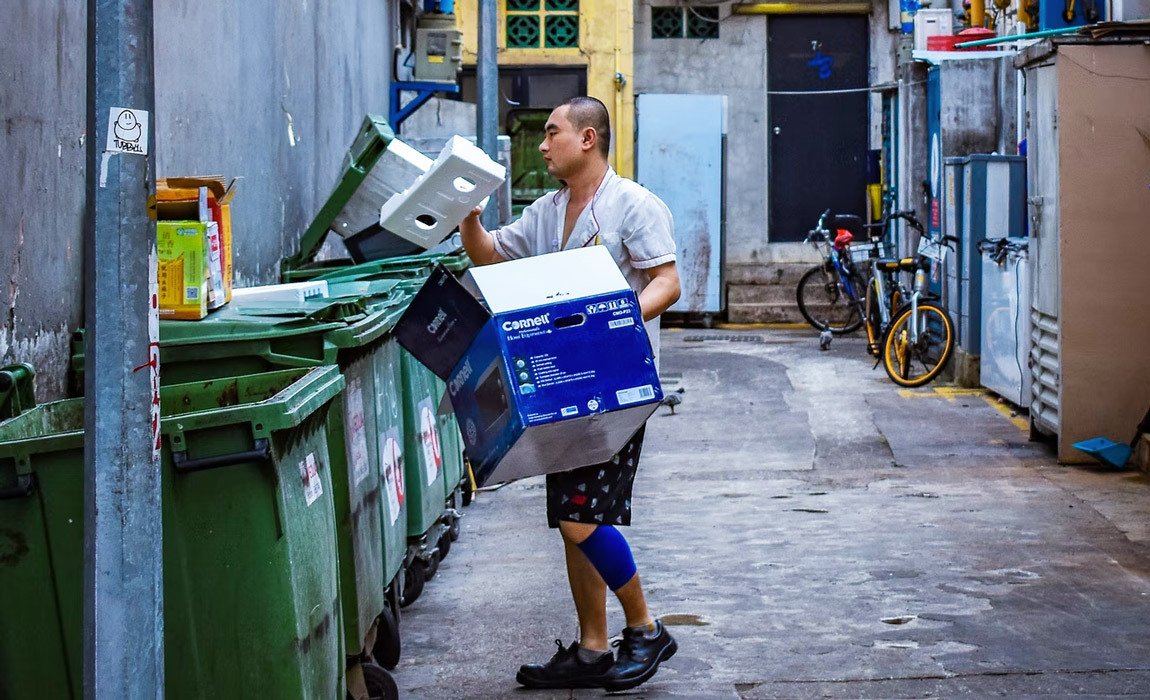Dumpster diving is what? Have you heard of this unconventional method for saving money? See the best places to dumpster dive and hunt useful stuff as a student.
Dumpster diving is the act of taking trash out of dumpsters.
Food, clothing, and technology are all examples of popular finds.
Even now, some divers rely on their ability to sift through mountains of trash in search of goods they can sell or donate to charitable organizations.
But where are the best places to dumpster dive and hunt useful stuff as a student? Find out now!
Why do people dumpster-dive?
1. Food insecurity
More than 38 million US households experienced food insecurity in 2020. To provide for their families, some people have chosen to use less traditional means of gathering resources.
For lower-income households and even those merely looking for methods to find some financial relief where they can, dumpster diving for food has become more widespread in recent years.
2. Reduce waste
Unfortunately, there is often a lot of trash in the US.
Reducing food waste, which accounts for 40% of all waste, is a top priority for many environmental campaigners.
Some people choose to salvage food and other products to cut down on waste.
3. Donations
Donations and trash reduction frequently go hand in hand.
A lot of the dumpster divers we see on Tik Tok or YouTube salvage items for themselves and donate a sizable amount of their haul to food banks and shelters.
Additionally, some people go garbage diving just to donate to others in need.
4. Frugality
Recent years have seen an increase in the popularity of frugal living as more millennials decide to retire early.
They may look for savings by using what they can rescue from their dumpster diving excursions as a result of their more stringent financial lifestyle.
5. Side hustle
Profits are yet another aspect of dumpster diving.
One of the most common motivations for dumpster diving is to find items to sell.
It is possible to clean, refinish, or even reuse furniture. You can sell metal to the nearby scrap yard.
For quick income, sell brand-new apparel or household items on eBay or Facebook Marketplace.
Read also: 15 Best Teaching Exchange Programs Abroad in 2023
6. Recycling
Recycling is another justification for trash diving. Not many companies use recycling bins, and any undesirable items are thrown in the trash instead.
Some people make an effort to contribute by taking goods out of dumpsters that can be recycled rather than ending up in a landfill.
Where they can, others will recycle for financial gain.
7. Artists
Even while it might not be the most common excuse for dumpster diving, an increasing number of artists are using rubbish as the foundation for their projects.
For their distinctive and frequently amazing works of art, these artists collect scraps of metal, wood, fabric, and plastic.
What are the Best Gears for Dumpster diving?
For convenience, sanitation, and safety, there are a few things you should always have with you if you intend to start dumpster diving.
Remember that these are sizable trash bins and that they could contain anything from shattered glass to sharp metal to mold, grease, rodents, and occasionally even other guests like raccoons.
- Sleeve clothing (shirt and pants)
- Closed-up shoes (safety shoes are best, but running shoes should do)
- Cut-resistant gloves
- Heavy-duty garbage bags or container
- Headlamp/flashlight
- Box cutter
- Trash picker/Grabber tool
- Dust mask (especially on construction sites)
- Glasses (optional)
- Wipes/hand sanitizer
- Crate/stepping stool for better access
What are the Best Places to Dumpster Dive and Hunt Useful Stuff as a Student?
1. Grocery stores
2. Bakeries
3. Retail stores
4. Pet stores
5. Electronic stores
6. Apartment complexes
7. Neighborhood homes
8. Colleges or Universities
9. Construction sites
10. Industrial areas
11. Thrift stores
12. Florists
13. Office Parks
14. Remodeling Sites
15. Dorm Complexes
1. Grocery stores

In the US, almost 40% of the food produced is wasted, amounting to 108 billion pounds of food.
The majority of this food is still edible and could have been given to charities.
As their dumpsters are frequently brimming with food, it should come as no surprise that grocery retailers dispose of a considerable amount of this discarded food.
While some grocery stores use compactors to keep their waste inside, many just use the regular dumpsters outside, which makes it simple to rescue the food.
2. Bakeries

Who doesn’t enjoy baking fresh pastries?
However, even though these goods are frequently contained in clean trash bags, it’s crucial to check to make sure no other debris has been put within the bag.
Additionally, don’t be afraid to ask the staff or manager if they can give you any freebies before they are thrown away.
In the last 30 minutes, our neighborhood Tim Hortons frequently offers extra donuts and boxes of donuts to consumers making a little purchase.
3. Retail stores

Retail establishments are known for throwing away goods. Stores may discard goods for a number of reasons, including:
- Seasonal goods that have outgrown their shelf space
- things in liquidation that are still unsold
- Overstocked goods
- Items returned that can’t be restocked, such as food, clothing, cosmetics, and feminine hygiene products
- Items with damage or breaks
- Recalled items
- the last few packets in a run of products
Dumpster divers are frequently seen roaming around at:
- Ulta
- Bath & Body Works
- Five Below
- T.J. Maxx
- Micheals
The finest places to trash dive are thought to be some of these five stores, though it may depend on where you are.
Returns of cosmetics and beauty products are frequently discarded by Ulta.
The primary product at Bath & Body Works is candles. Seasonal merchandise and home accents are abundantly discounted at Michaels and T.J. Maxx.
4. Pet stores

Pet products are frequently found in store dumpsters like those at Pet Smart.
These goods may include recently purchased pet accessories such as toys, bedding, leashes, and food that will shortly expire.
Keep a watch out though, since some divers have rescued small live pets like fish and birds that were returned to pet shops and were otherwise thrown out with the trash.
5. Electronic stores

Electronic retailers like Best Buy and GameStop get returns every day, just like all other retailers.
While some returned merchandise can be restocked, other goods are bound for liquidation pallets, and still other items are trashed.
Since recycling electronics can be expensive, some companies choose to just throw away returned goods that they can’t sell.
6. Apartment complexes
Apartment buildings can be a great place to find some amazing bargains.
Instead of going around your neighborhood looking for specific findings, you gain from sorting through many people’s rubbish.
Apartment buildings theoretically contain all kinds of trash that individuals discard.
However, the most frequently thrown object types are typically furniture, home items, and outdated gadgets, particularly during the moving season.
7. Neighborhood homes
You can choose to drive around residential areas in search of roadside gems, which is a little different than searching apartment complexes.
Although you might try the day before garbage pickup, bulky trash day is what we advise.
Larger goods are often collected once a month in many places.
It’s the ideal time to get old appliances and furnishings by scouting the area the day before.
8. Colleges or Universities
At the end of each semester, students are infamous for throwing away their belongings. As a result, books and furniture can often be found in dumpsters at colleges.
From our time in college, we can say with certainty that one thing: textbooks are expensive.
These have high resale values, particularly if you find them for nothing when dumpster diving.
Imagine when they are free! Finding cheap textbooks at secondhand stores and reselling them was one of my little side jobs when I was in school.
9. Construction sites
Have you scheduled any impending renovations? Construction sites are one of the best places to dumpster dive.
To be clear, pallets of tiles or bricks that are lying around building sites waiting to be installed are not to be taken.
However, you may frequently discover scrap metal, paint cans, leftover cabinetry, and other items within their big dumpsters.
10. Industrial areas
If you’ve been operating a company in an industrial area for more than ten years, during that time you will observe numerous items get thrown away by other companies.
You might find everything from wasted batches of lotion to fabric bolts, depending on the businesses and manufacturers in the region.
Additionally, a lot of them may be found discarded in corners and are the ideal place to find unwanted wooden pallets to sell or reuse.
To avoid trespassing, be in mind that dumpsters in these regions occasionally hide behind closed fences.
See also: 13 Best Fashion Schools in Canada in 2023
11. Thrift stores
Don’t forget to look in the trash cans behind your neighborhood thrift shops.
Although thrift shops are designed to sell their merchandise, they frequently receive too many contributions to handle.
Additionally, some secondhand shops lack space for furniture and appliances.
Unfortunately, some consumers don’t check ahead of time and continue to leave huge things on the curb or in their donation zones after hours, forcing the store to dispose of them due to a shortage of capacity.
12. Florists
Another industry that depends on fresh goods is the floral industry. Their blossoms are discarded once they are no longer in bloom.
Since flowers are more of a luxury than a need and not as many people are looking for them, we put florist businesses on this list.
13. Office Parks
The best area to find furniture, gadgets, and other goods that have been discarded by companies is in office parks. Desks, chairs, and other office items that have been replaced by corporations are frequently still in excellent condition. Once more, before getting started, make sure to verify with the property management.
14. Remodeling Sites
The best places to find scrap metal, wood, and other recyclable goods are yard sales, thrift shops, and garage sales.
You could also come across homeowners’ replacements of cabinets, tools, appliances, and other items when working on home renovation tasks.
You should use particular caution in this area because it’s possible that some dumpster locations contain dangerous materials.
15. Dorm Complexes
Dorm buildings are fantastic places to find furniture, clothing, and other goods that students have discarded. Desks, chairs, and other equipment that were in fine condition but were replaced by students are frequently found.
The conclusion of the school year or the break between semesters are the perfect times to visit your neighborhood college dormitories since people may be relocating from one building to another or leaving for home.
Pornography, notes, and love letters, as well as drug-related paraphernalia like you’d expect to find being used by college students, are among the jewels that anyone looking for humor and other intriguing stuff that might not be really valuable – but entertaining to locate – may also find here.
Is dumpster diving illegal?
The issue of legality is still up for discussion.
Dumpster diving became permitted in all 50 states following the Supreme Court decision in California v. Greenwood in 1988, but there are still many more factors to take into account.
To dumpster dive lawfully, your actions must not conflict with local, state, or federal laws, as well as those governing businesses, restaurants, and cities.
Dumpster diving is prohibited in that region, as evidenced by private property signage, fencing, locked dumpsters, and private property markers.
Use your best judgment when determining if you are on private property because some situations, such as the proximity of the dumpster to a structure or store, might be a little ambiguous.
See also: What are Students Educational Tours? Best Places For Students To Go in 2023
Frequently Asked Questions
Dumpster diving is the practice of searching through trash for precious objects. Dumpster diving is a great way to find anything, including clothing, furniture, and electronics. Thus, Dumpster diving not only allows you to save money, but it also allows you to discover some incredible treasures!
There are several ways to respond to this question, but the simplest is to say that you should be ready to assume that you will encounter problems, even if what you are doing is technically lawful.
Dumpster diving is a risky yet rewarding way to discover hidden gems. Always get permission from the property owner before entering a dumpster. So that you don’t get injured or dirty, make sure you put on gloves and protective clothing. Since this is trash, it could include anything from hazardous chemicals and human waste to old but still fully functional technology, depending on where you are dumpster diving.
The greatest days of the week to dumpster dive near grocery stores, retail businesses, and electronics stores are Tuesdays and Fridays. Tuesdays and Fridays are often when grocery and retail shops restock. This is due to the fact that food and garments frequently arrive on Fridays and Tuesdays, respectively.
Dumpster divers look for goods in good functioning order such as food, furniture, clothing, and similar stuff. Some people engage in this activity because they must due to poverty, while others do it for ideology or professionally and methodically for financial gain.
Conclusion
Dumpster diving is an excellent way to discover free goods like food, clothing, furniture, and electronics that might otherwise wind up in a landfill.
These things can either be used by you personally, donated, or sold for cash.
To make sure you don’t break any laws that could land you in trouble, research state and local legislation before going to a dumpster in your neighborhood.








